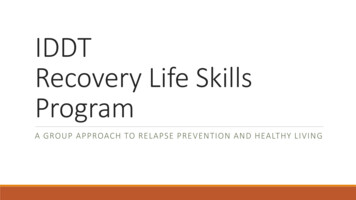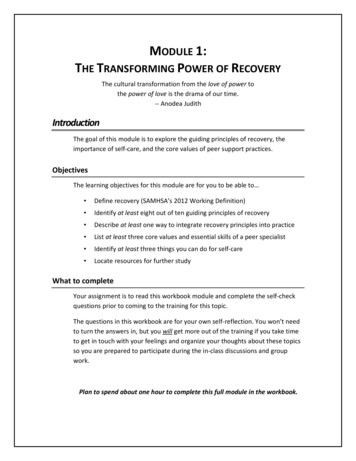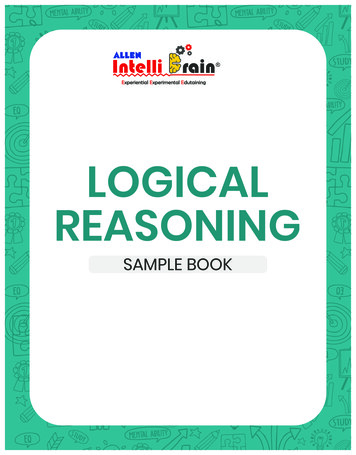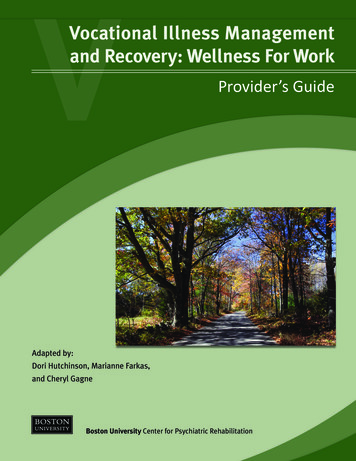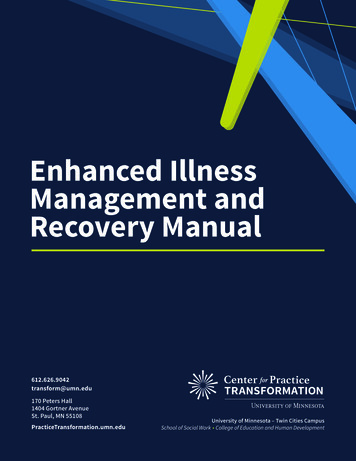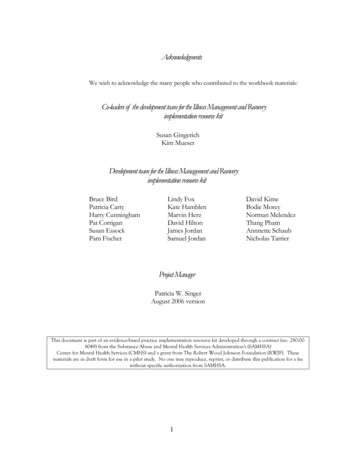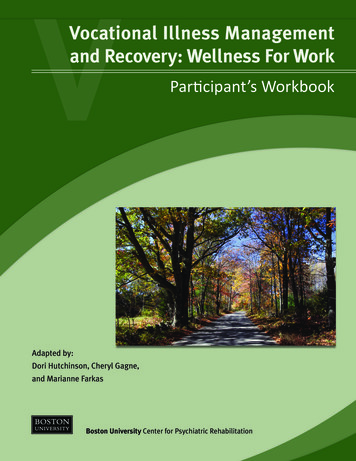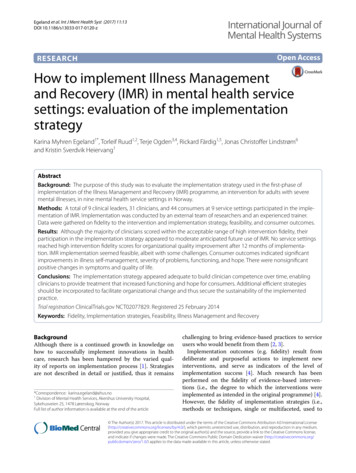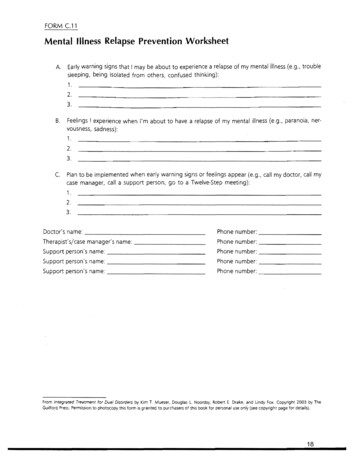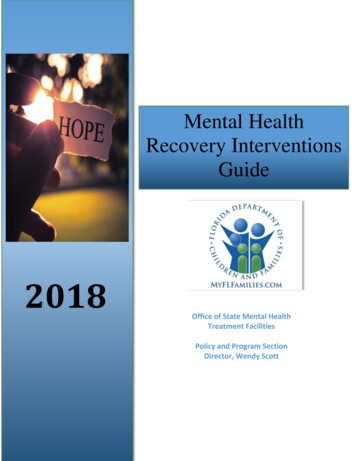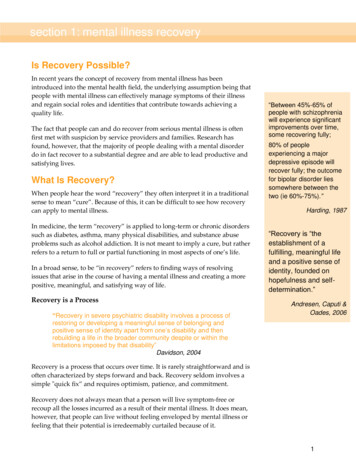
Transcription
section 1: mental illness recoveryIs Recovery Possible?In recent years the concept of recovery from mental illness has beenintroduced into the mental health field, the underlying assumption being thatpeople with mental illness can effectively manage symptoms of their illnessand regain social roles and identities that contribute towards achieving aquality life.The fact that people can and do recover from serious mental illness is oftenfirst met with suspicion by service providers and families. Research hasfound, however, that the majority of people dealing with a mental disorderdo in fact recover to a substantial degree and are able to lead productive andsatisfying lives.What Is Recovery?When people hear the word recovery they often interpret it in a traditionalsense to mean cure . ”ecause of this, it can be difficult to see how recoverycan apply to mental illness.In medicine, the term recovery is applied to long-term or chronic disorderssuch as diabetes, asthma, many physical disabilities, and substance abuseproblems such as alcohol addiction. It is not meant to imply a cure, but ratherrefers to a return to full or partial functioning in most aspects of one s life.In a broad sense, to be in recovery refers to finding ways of resolvingissues that arise in the course of having a mental illness and creating a morepositive, meaningful, and satisfying way of life.Recovery is a Process“Recovery in severe psychiatric disability involves a process ofrestoring or developing a meaningful sense of belonging andpositive sense of identity apart from one’s disability and thenrebuilding a life in the broader community despite or within thelimitations imposed by that disability”Davidson, 2004“Between 45%-65% ofpeople with schizophreniawill experience significantimprovements over time,some recovering fully;80% of peopleexperiencing a majordepressive episode willrecover fully; the outcomefor bipolar disorder liessomewhere between thetwo (ie 60%-75%).”Harding, 1987“Recovery is “theestablishment of afulfilling, meaningful lifeand a positive sense ofidentity, founded onhopefulness and selfdetermination.”Andresen, Caputi &Oades, 2006Recovery is a process that occurs over time. It is rarely straightforward and isoften characterized by steps forward and back. Recovery seldom involves asimple "quick fix and requires optimism, patience, and commitment.Recovery does not always mean that a person will live symptom-free orrecoup all the losses incurred as a result of their mental illness. It does mean,however, that people can live without feeling enveloped by mental illness orfeeling that their potential is irredeemably curtailed because of it.1
Four Key Componentsof the RecoveryProcessFinding and maintaininghope—believing in oneself,having a sense of personalagency, feeling optimisticabout futureThe re-establishment of apositive identity—findinga new identity whichincorporates illness butretains a core, positivesense of selfFinding meaning in life—making sense of illness,finding a new meaning inlife despite illnessTaking responsibility forone’s life—feeling incontrol of illness and lifeAndresen, Caputi & Oades,2003Mental illness can at times impede a person s ability to exercise choice andmanage their life, but there are still important areas where even individualswho are quite ill can make choices and take action for example, developingsocial contact, taking advantage of professional help and services available,and moving towards looking after their own health.Recovering from a mental illness can involve learning new skills (andperhaps the relearning of some old ones), coping with challenges, andassuming a new role the role of someone who is successful despite having amental illness.We cannot predict the future of every person who experiences mental illness.We can, though, accompany them as they grapple with the tough realities oftheir lives and be there to celebrate their successes.Essential Ingredients for RecoveryRecovery means people reaching their full potential as responsibleindividuals and community members and is facilitated through relationshipsand environments that provide hope, empowerment, choices, andopportunities.The following is a list of essential ingredients in the recovery process:Acceptance: Acceptance of the diagnosis by the ill relative, family, andfriends is essential for the process of recovery to begin. Acceptance is morelikely to result in early intervention.Early Intervention: Early intervention and early use of new medications leadto better medical outcomes for the individual. The earlier your ill relative isdiagnosed and stabilized with treatment, the better the long-term prognosis.Adherence to Treatment: Medication and therapy greatly aid in recovery.Although the benefits may not be completely obvious at first, following atreatment plan will significantly improve your ill relative s mental health.Empowerment: Recovery is aided when people are given the support andeducation to make their own decisions and to exercise their “right to try”.Holistic Approach: Recovery encompasses the varied aspects of anindividual s life, including housing, employment, education, recreation,mental health and healthcare services, addictions treatment, spirituality,creativity, social networks, and community participation.2
Strengths-Based Approach: Recovery focuses on validating and buildingupon the strengths, capabilities, coping skills, resiliency, and inherent worthof individuals. This involves a constant awareness that you are not yourillness .“Learn when to switch from the caregiver to the supportive role andthen let me monitor my own recovery.”Husband diagnosed with bipolar disorderResponsibility: Outcomes are improved when people take personalresponsibility to pursue and sustain recovery to the greatest extent possible.This involves taking steps towards identifying and achieving personal goalsand can include creating a Ulysses Agreement or Advance Plan which willenable your ill relative to state what they would like to happen in the eventthat they become ill or relapse. (See Section 2: Caregiving Planning for moreon Advance Planning and Ulysses Agreements.)How Family Members Can HelpWith an understanding of the essential ingredients for recovery, familymembers are better equipped to:Nurture hopefulness, with high expectationsAim for recoverygoalsa full life, beginning with clear, attainable, smallerFoster self-determination and critical thinkingValue healthy independenceSupport their ill relative to take risks and exercise their right to tryEmphasize opportunities for community connections and rebuilding ameaningful life3
How Does the Family Recover?“Hope has beenconsistently defined asgrounded in achievablereality It has beenidentified as a centralfeature of recovery fromchronic illness. Thepresence of hope inpatients predicts betteroutcomes oftreatment Hope,along with acceptanceand support, are centraland necessary parts ofrecovery Hope iscentral to the process ofreconstruction of a senseof self in patients withchronic mentalillness .Hopefulness inthe caregiver is a crucialpart of the copingprocess ”Bland, 2007Families embark on a process of recovery alongside their relative. Much likethe ill person s journey, it will not be straightforward and will involve bothprogress and setbacks. Many challenges, such as acceptance of the illness,developing coping strategies, and building on successes, will be present forboth the ill person and the family. Some challenges will be facedsimultaneously while others will be staggered in their timing and severity.Each family s journey will be unique and will depend upon a host of factors,including the nature and severity of illness. While specific circumstancesvary, several families in our focus group talked about recovery as meaningthat the illness was no longer in the foreground. They expressed a sense ofmoving away from living and breathing mental illness toward focusing ongetting their own lives back on track.The following is a sampling of remarks made by family caregivers regardingthe recovery process:You learn to define life with a new reality.It s the ability to cope with crises so it doesn t take its toll like it has in thepast.It s acceptance of the situation; getting over the fear that something willhappen.It s being able to not get sucked in.It s developing interests outside of concern with their well-being.It s living life as one wants to.Hope And The Expectation Of SuccessWhen we speak of hope, we are not advocating a false optimism whereeverything will turn out well when the facts suggest the opposite. Instead, webelieve in a hope rooted in the real experiences of thousands of people whohave recovered from mental illness to become successful participants insociety.It is possible to gain effective illness management and lead meaningful,productive lives. Given the proper treatment and support from caring peoplearound them, many people experience significant mental health gains,leaving them with minimal interference from their illness.4
SummaryRecovery is a concept that has gained acceptance in the mental health field.Family members can also engage in their own recovery journey alongsidetheir ill relative.“Relief of symptoms is only the first step in treating depression orbipolar disorder. Wellness or recovery is a return of a life that youcare about. Recovery happens when your illness stops getting inthe way of your life.”Depression and Bipolar Support Alliance, 20075
6
Recovery does not always mean that a person will live symptom-free or recoup all the losses incurred as a result of their mental illness. It does mean, however, that people can live without feeling enveloped by mental illness or feeling that their potential is irredeemably curtailed because o
